2012新课标同步导学高一英语课件:1.3(人教·陕西专版必修2)
文档属性
| 名称 | 2012新课标同步导学高一英语课件:1.3(人教·陕西专版必修2) | 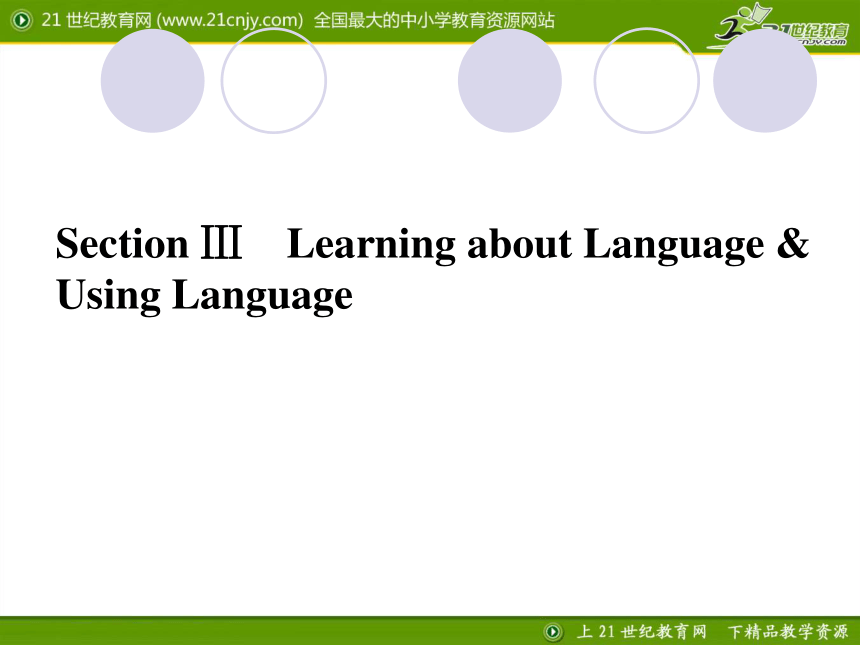 | |
| 格式 | zip | ||
| 文件大小 | 781.8KB | ||
| 资源类型 | 教案 | ||
| 版本资源 | 人教版(新课程标准) | ||
| 科目 | 英语 | ||
| 更新时间 | 2012-05-13 10:55:49 | ||
图片预览

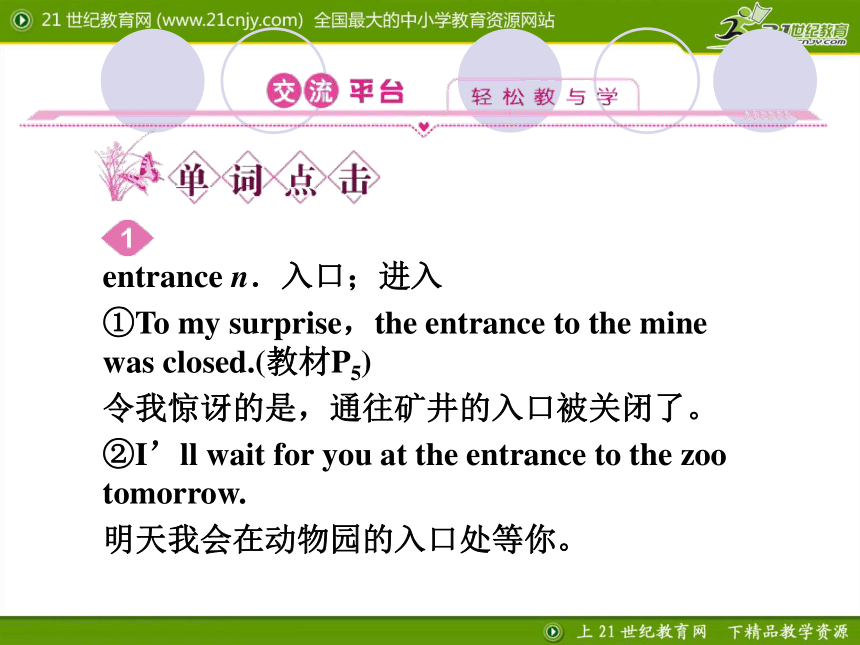
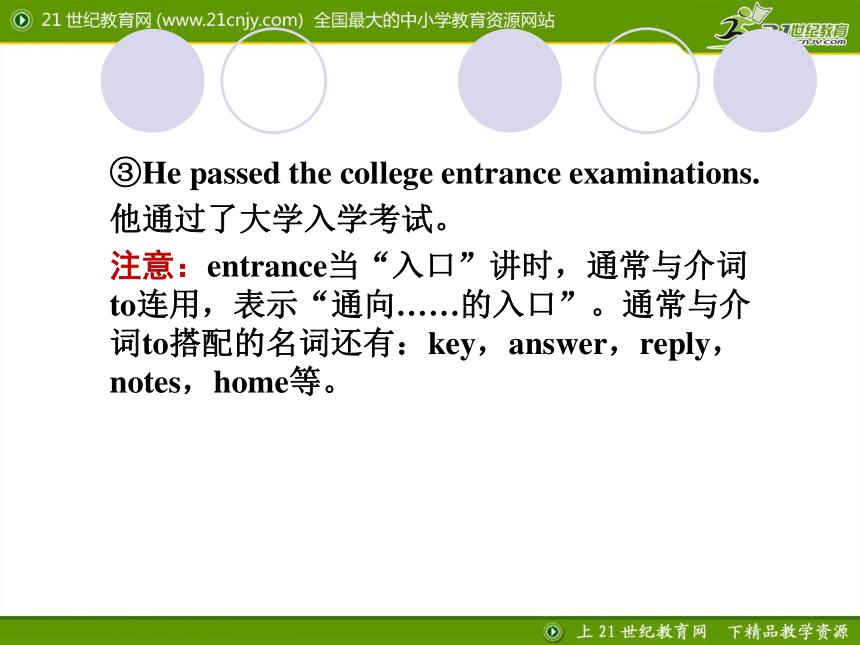
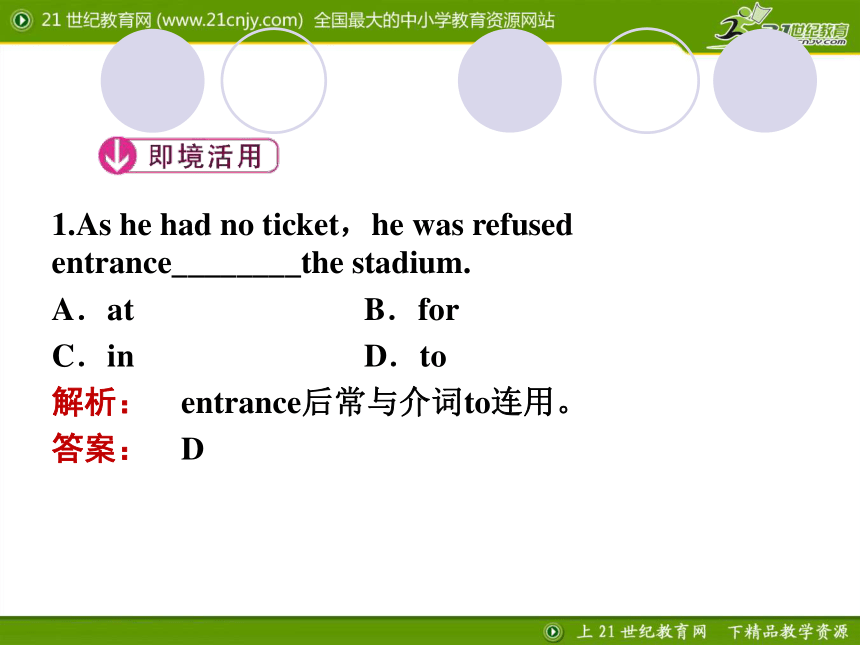
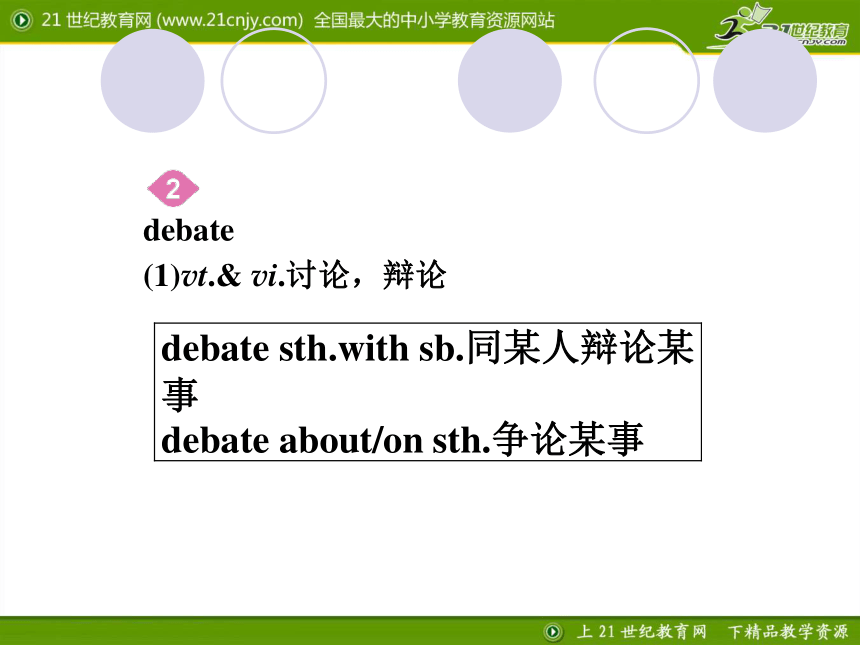
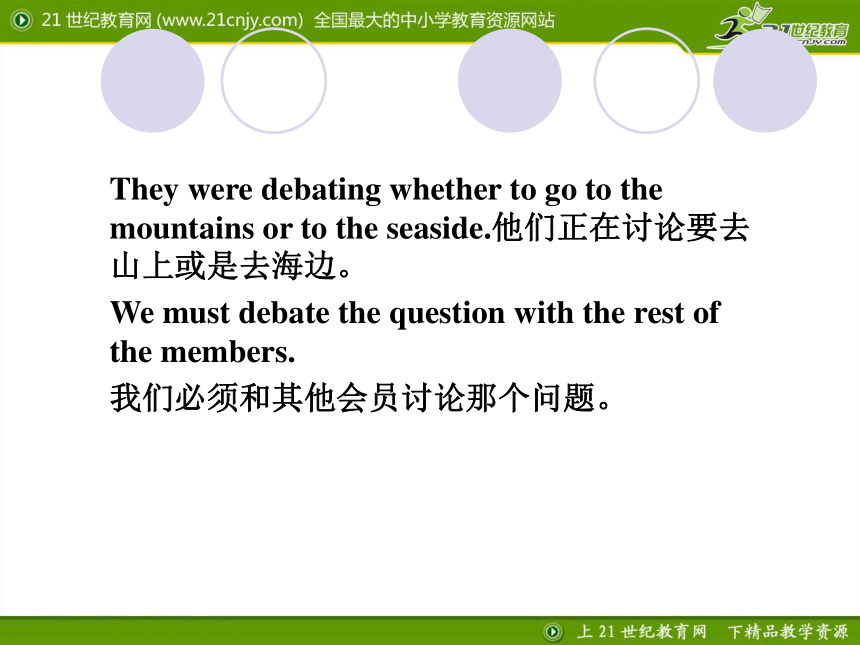
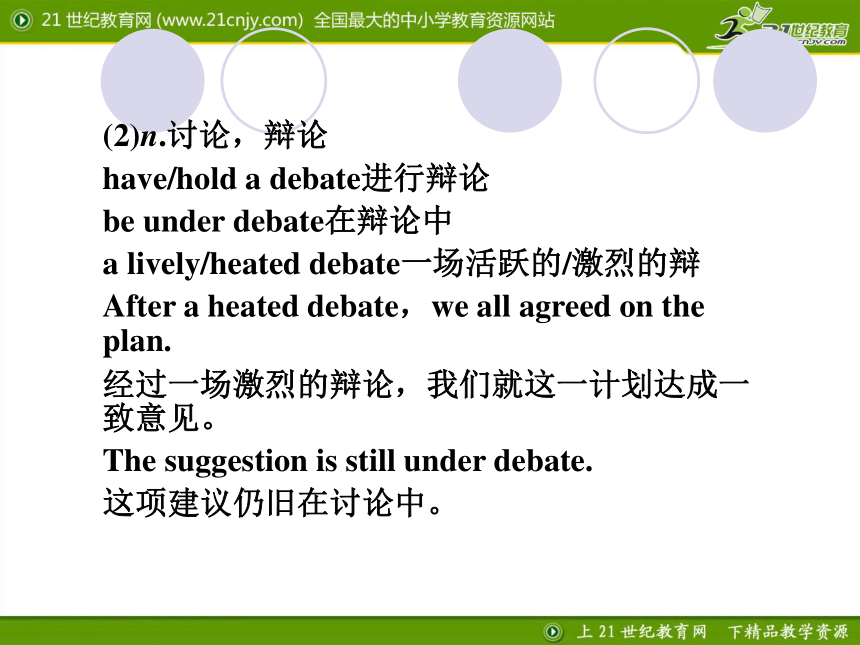
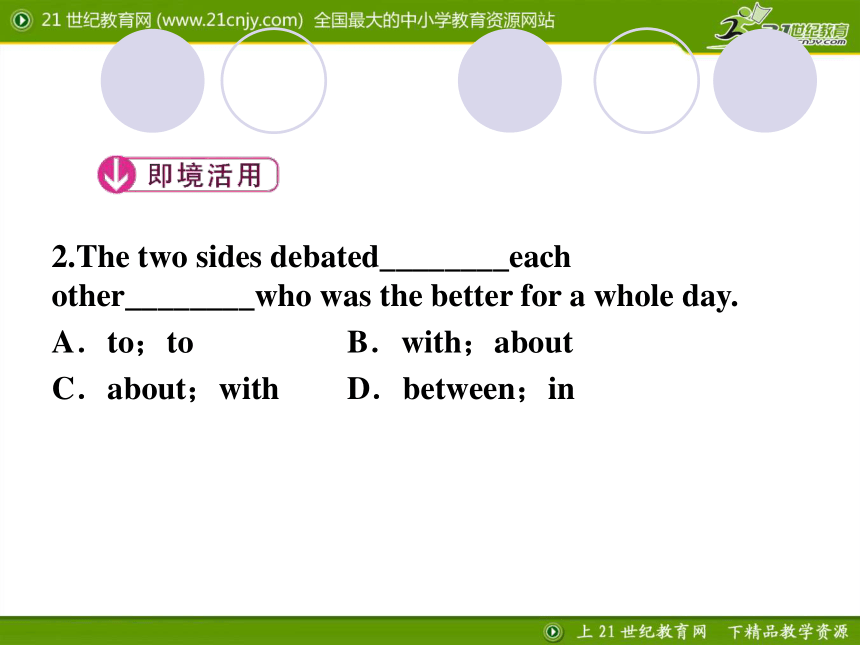
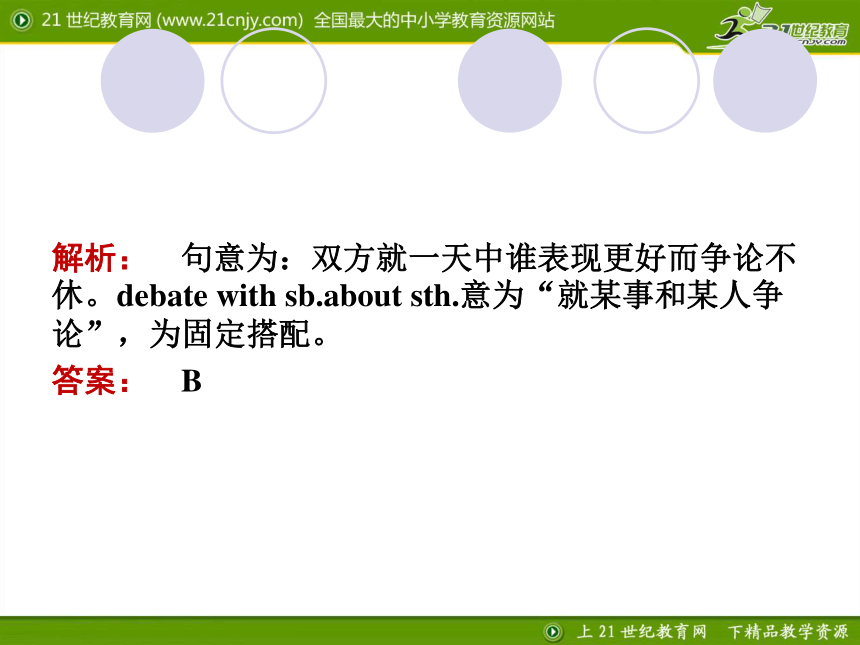
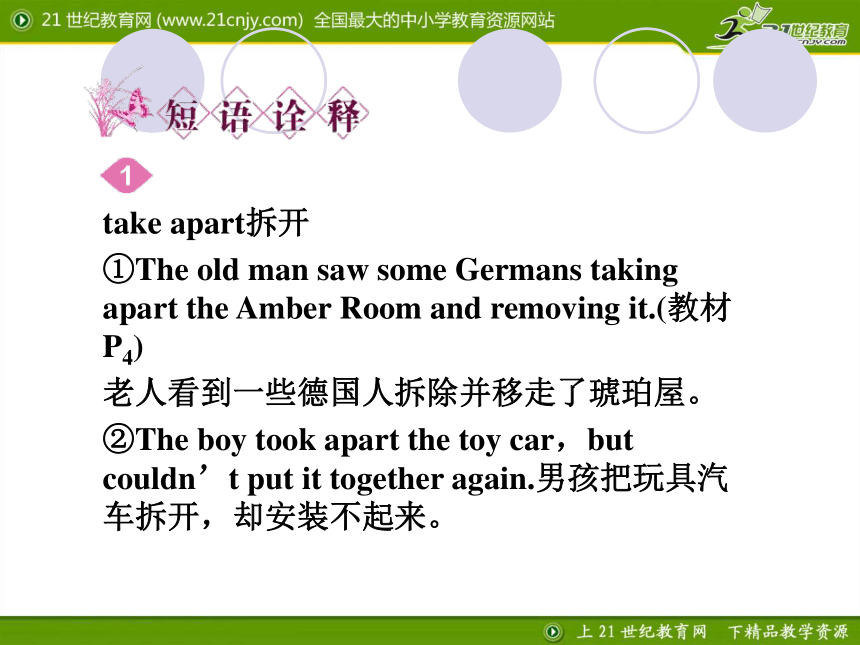
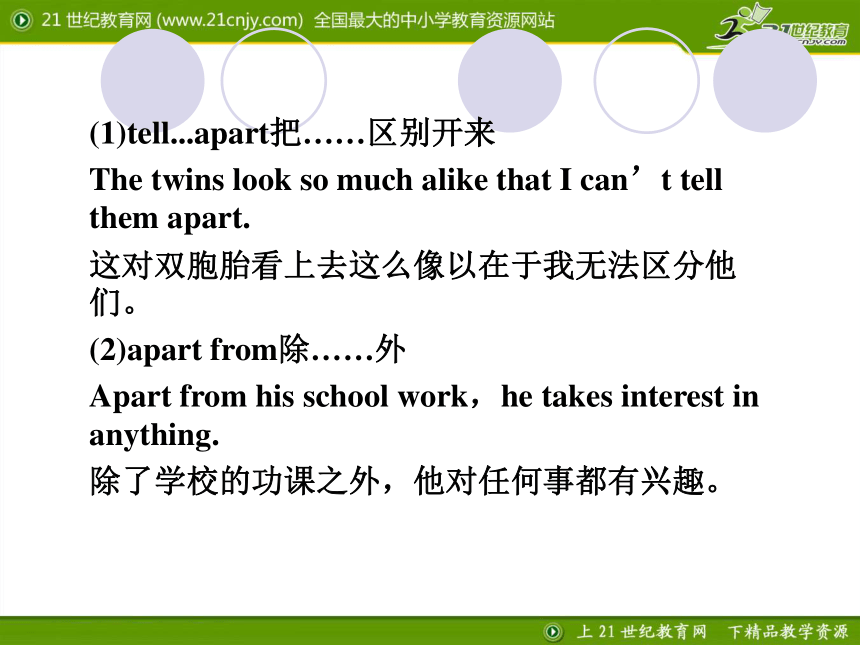
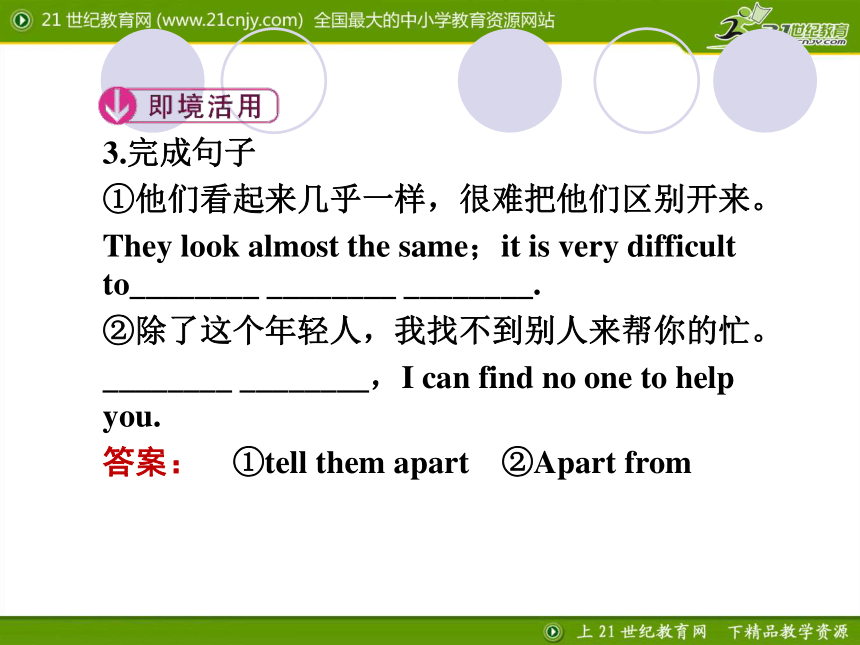
文档简介
(共65张PPT)
Section Ⅲ Learning about Language & Using Language
entrance n.入口;进入
①To my surprise,the entrance to the mine was closed.(教材P5)
令我惊讶的是,通往矿井的入口被关闭了。
②I’ll wait for you at the entrance to the zoo tomorrow.
明天我会在动物园的入口处等你。
③He passed the college entrance examinations.
他通过了大学入学考试。
注意:entrance当“入口”讲时,通常与介词to连用,表示“通向……的入口”。通常与介词to搭配的名词还有:key,answer,reply,notes,home等。
1.As he had no ticket,he was refused entrance________the stadium.
A.at B.for
C.in D.to
解析: entrance后常与介词to连用。
答案: D
debate
(1)vt.& vi.讨论,辩论
debate sth.with sb.同某人辩论某事
debate about/on sth.争论某事
They were debating whether to go to the mountains or to the seaside.他们正在讨论要去山上或是去海边。
We must debate the question with the rest of the members.
我们必须和其他会员讨论那个问题。
(2)n.讨论,辩论
have/hold a debate进行辩论
be under debate在辩论中
a lively/heated debate一场活跃的/激烈的辩
After a heated debate,we all agreed on the plan.
经过一场激烈的辩论,我们就这一计划达成一致意见。
The suggestion is still under debate.
这项建议仍旧在讨论中。
2.The two sides debated________each other________who was the better for a whole day.
A.to;to B.with;about
C.about;with D.between;in
解析: 句意为:双方就一天中谁表现更好而争论不休。debate with sb.about sth.意为“就某事和某人争论”,为固定搭配。
答案: B
take apart拆开
①The old man saw some Germans taking apart the Amber Room and removing it.(教材P4)
老人看到一些德国人拆除并移走了琥珀屋。
②The boy took apart the toy car,but couldn’t put it together again.男孩把玩具汽车拆开,却安装不起来。
(1)tell...apart把……区别开来
The twins look so much alike that I can’t tell them apart.
这对双胞胎看上去这么像以在于我无法区分他们。
(2)apart from除……外
Apart from his school work,he takes interest in anything.
除了学校的功课之外,他对任何事都有兴趣。
3.完成句子
①他们看起来几乎一样,很难把他们区别开来。
They look almost the same;it is very difficult to________ ________ ________.
②除了这个年轻人,我找不到别人来帮你的忙。
________ ________,I can find no one to help you.
答案: ①tell them apart ②Apart from
4.It’s easy to take a machine________but difficult to put it together.
A.away B.apart
C.out D.off
解析: take sth.apart把……拆开。
答案: B
agree with
(1)同意;与……保持一致
①Some people may not agree with this opinion but they also cannot prove that they are right.(教材P5)有些人可能不同意这种看法,但他们也不能证明他们是正确的。
②I agree with what you said.我同意你说的话。
(2)(食物、气候等)适合某人
③The food in Sichuan doesn’t agree with me.
四川的食物不适合我的胃口。
(1)agree on sth.就某事达成一致协议或取得一致意见
(2)agree to sth.接受,认可,同意,to为介词,后常跟表示“计划,建议,安排,条件”等的词
(3)agree to do sth.同意做某事
④We agreed on the date for the meeting.
我们就会议的日期取得一致意见。
⑤Do you think he will agree to our plan
你认为他会同意我们的计划吗?
5.(2010·陕西卷)You look well.The air and the sea foods in Sanya must________you.I suppose.
A.agree with B.agree to
C.agree on D.agree about
解析: agree with sb.同意,(食物、气候等)适合某人;agree to后接表示“建议,办法,计划”等的名词,不接人称代词;agree on后接表示具体协议的条件、计划、行动等词;agree about无此搭配。
答案: A
rather than而不是;与其说……不如说……
①He/She only cares about whether the eyewitness has given true information,which must be facts rather than opinions.(教材P5)
他/她关心的只是证人是否提供了真实的信息,它们必须是事实而不是看法。
②The sweater she bought was beautiful rather than cheap.
与其说她买的这件毛衣便宜不如说它漂亮。
would do...rather than do...
=would rather do...than do...
=prefer to do...rather than do...
宁愿做……而不愿做…
③I would die rather than give in to him.
我宁可死也不愿向他屈服。
④John,rather than you,is to blame.
要受责备的是约翰,而不是你。
6.Nowadays,rather than________letters,many people prefer to telephone.
A.to write B.write
C.writing D.wrote
解析: 该句为prefer to do...rather than do...句型的变化形式,rather than提前,其后仍然使用动词原形。
答案: B
think highly of看重;器重;对……评价很高
①I think highly of those who are searching for the Amber Room.(教材P7)我很欣赏那些寻找琥珀屋的人们。
②The managers thought highly of his plan,which made him very happy.经理们对他的计划评价很高,这使他非常高兴。
think much/well of...(=think highly of...)
看重;器重;对……评价高
think ill/poorly/badly of认为……不好
think nothing of...认为……没什 么
③She was badly thought of at first,wasn’t she
起初她给别人的印象很差,是吧?
④Pop music is highly/well thought of by most young people.
大多数年轻人对流行音乐很是赞赏。
7.(2011·湖州高一检测)—I find the book very interesting.
—Do you?But I________.
A.don’t think much of it
B.don’t think high of it
C.didn’t think many of it
D.didn’t think highly of it
解析: 句意为:我并不看重这本书。根据语境,指现在的看法应用现在时态。
答案: A
8.—Many of us have a________opinion of him.
—But he is thought________of by our leaders.
A.bad;worse B.badly;highly
C.bad;better D.badly;more
解析: 第一句表示“我们许多人对他评价不高”,故用have a bad opinion of;第二句表示“但他却受到领导较好的评价”,故用be thought better of。
答案: C
It can be proved that China has more people than any other country in the world.(教材P5)中国人口比世界上任何其他国家的人口都多,这是可以得到证实的。
(1)这是一个主从复合句,句中含有一个主语从句。句中it是形式主语,真正的主语是that引导的名词性从句,即主语从句。当主语从句较长时,常用it作形式主语,而把真正的主语——主语从句放在后面,以避免“头重脚轻”的毛病,保持句子结构上的平衡。
It doesn’t matter whether he will go or not.
他去不去都没有关系。
It is certain that your son will do well in his exam.
你儿子在考试中取得好成绩是毋庸置疑的。
(2)prove
①vt.证明,证实
He has proved his courage in the battle.
他已在这场战斗中证明了自己的勇气。
How did you prove that he was the robber
你如何证明他是那名抢劫犯?
②link v.证明是……,结果是……
prove+(to be)+n./adj.
History proved them (to be) wrong again.
历史证明他们再一次错了。
It proved (to be) much more difficult than she had supposed.
结果比她预想的要难得多。
9.(2010·全国卷Ⅱ)The doctor thought________would be good for you to have a holiday.
A.this B.that
C.one D.it
解析: 代词it的两个重要用法是作形式主语和形式宾语。本题考查形式宾语,it在这里指代后面的真正宾语to have a holiday。
答案: D
10.The way he thought________with the problem________to be correct,which made all the people present relaxed.
A.of to deal;proved
B.of dealing;proved
C.of to deal;was proved
D.of dealing;was proved
解析: the way后有两个定语,一个是定语从句he thought of,一个是不定式短语to deal with...;prove为连系动词用法。
答案: A
11.(2010·合肥高一检测)________time went by,the theory that he supported________correct.
A.As;was proved
B.With;proved
C.As;proved
D.With;being proved
解析: 逗号前为一时间状语从句,故只能用as引导;第二空表示“证明是”,此时prove为连系动词用法,不能用于被动语态。
答案: C
In a trial,a judge must decide which eyewitnesses to believe and which not to believe.(教材P5)在审判中,法官必须断定哪些证人可以相信,哪些证人不能相信。
which eyewitnesses to believe and which not to believe是两个带疑问代词which的动词不定式短语,作decide的宾语,相当于一个宾语从句。该结构可以作主语、宾语和表语。
①When to go out for a picnic has not been decided.
什么时候外出野餐还没有定下来。
②Have you decided where to spend your holiday
你们决定到哪里去度假了吗?
③The question is when to start.问题是什么时候出发。
12.(2010·辽宁卷)—It’s no use having ideas only.
—Don’t worry.Peter can show you________to turn an idea into an act.
A.how B.who
C.what D.where
解析: 虽然四个词都可以和动词不定式连用,但是意义不同。how表示“怎样”,强调方式。而who和what是连接代词,一般在不定式短语中作宾语,此句中动词不定式有宾语,不再需要宾语,所以排除;where则强调地点。
答案: A
13.(2009·四川卷)He told us whether________a picnic was still under discussion.
A.to have B.having
C.have D.had
解析: 考查“疑问词/连词+不定式”结构。该结构由疑问代词(what,who,whom,which)/疑问副词(when,where,why)/连接词(whether)后面接带to的不定式构成,起名词的作用,在句中可以作主语、表语、动词(或介词)的宾语等。本题中该结构作主语。
答案: A
I don’t agree that they should return the treasure to Russia if they find it.Nor do I think they should give it to any government.(教材P7)
如果他们找到了这一宝藏,我不同意他们把它还给俄国。我认为他们也不应该把它交给任何一个政府。
nor/neither+连系动词/情态动词/助动词+主语,表示另一主语与前面所述的否定概念相同。意义为“……也一样不,……也不”。
My sister can’t swim,nor/neither can her husband.
我姐姐不会游泳,她丈夫也不会。
I haven’t seen the film,nor/neither has Mary.
我没看过这部电影,玛丽也没看过。
I don’t know,nor do I care.我不知道,也不关心。
(1)“So+系动词(情态动词或助动词)+(与前句不同的)主语”表示前句中的肯定情况也适用于另一人或物。so代替上文中的动作或概念,表示“也是这样,也是如此”。注意:两句中应使用同类助动词且应时态一致。
She can speak French and so can her husband.
=She can speak French and her husband can speak French,too.她会讲法语,她丈夫也会。
I have lost a bike and so has he.
=I have lost a bike and he has also lost one.
我丢了一辆自行车,他也丢了一辆。
(2)“So+(与前句相同的)主语+系动词(情态动词或助动词)”表示“某人(某物)确实……”,so含有“确实”之意。
—She speaks French very well.
——她法语说得很好。
—So she does.——她说得确实很好。
14.Bill wasn’t happy about the delay of the report by Jason,and________.
A.I was neither B.neither was I
C.I was either D.either was I
解析: 句意为:比尔对贾森做报告推迟这件事不高兴,我也不高兴。根据题意可知,我也不(高兴),neither/nor+系动词/助动词/情态动词+sb.表示某人也不(同意或赞成上文的观点),易把either看做neither,无either was I句式,故选B。
答案: B
15.If Joe’s wife won’t go to the party,________.
A.he will either B.neither will he
C.he neither will D.either he will
解析: 考查倒装句。其形式为neither/nor+助动词+主语。
答案: B
16.Mary never does my reading in the evening,________.
A.so does John B.John does too
C.John doesn’t too D.nor does John
解析: 前面句中有否定词never,答案非D莫属。too不能用在否定句中。
答案: D
17.—Maggie had a wonderful time at the party.
—________,and so did I.
A.So she had B.So had she
C.So she did D.So did she
解析: 答语同意上句话,即“Maggie”在晚会上的确玩得很愉快。
答案: C
18.—I like to surf the Internet but I don’t like to watch TV.
—________.
A.So do I B.Nor do I
C.As do I D.So it is with me
解析: So it is/was with...“……也这样”,主要用来表示“一个人的多种情况与另一个人的多种情况是一致的”。
答案: D
Ⅰ.单词拼写
1.We believe that he is the thief.However,we have no e________against him.
答案: evidence
2.A bomb e________suddenly by the roadside and destroyed his car.
答案: exploded
3.Slowly the ship started to s________.People had to leave quickly.
答案: sink
4.Almost nobody knew why he refused to attend the________(审判).
答案: trial
5.There was a heated________(辩论) on whether mothers should work or not,especially when their children are very young.
答案: debate
6.She will be waiting for you at half past seven at the________(入口) to the cinema.
答案: entrance
Ⅱ.完成句子
1.I sent him a watch as his birthday gift,and he gave me an MP3________ ________(作为回报).
答案: in return
2.I’m always________ ________ ________(寻找) someone who can understand me.
答案: in search of
3.It took them________ ________(不到) one year to build this monument.
答案: less than
4.At that time,China and Japan were________ ________(处于交战状态),so traveling was extremely difficult.
答案: at war
5.The old man saw some people________ ________(拆开) the machine and then removing it.
答案: taking apart
6.The boy’s father________ ________ ________(高度赞扬) the policeman who had saved his son from the lake.
答案: thought highly of
Ⅲ.句型必背
1.举例来说,中国人口比世界上任何其他国家的人口都多,这是可以得到证实的。
For example,it________ ________ ________ ________China has more people than any other country in the world.
答案: can be proved that
2.在审判中,法官必须断定哪些证人可以相信,哪些证人不能相信。
In a trial,a judge must decide________ ________ ________ ________and which not to believe.
答案: which eyewitnesses to believe
3.他(她)关心的只是目击者是否提供了真实的信息,这些信息必须是事实而不是个人观点或看法。
He/She only cares about whether the eyewitness has given true information,which must be facts________ ________ ________.
答案: rather than opinions
4.我也认为他们不应该把它交给任何政府。
________ ________ ________ ________they should give it to any government.
答案: Nor do I think
练规范、练技能、练速度
Section Ⅲ Learning about Language & Using Language
entrance n.入口;进入
①To my surprise,the entrance to the mine was closed.(教材P5)
令我惊讶的是,通往矿井的入口被关闭了。
②I’ll wait for you at the entrance to the zoo tomorrow.
明天我会在动物园的入口处等你。
③He passed the college entrance examinations.
他通过了大学入学考试。
注意:entrance当“入口”讲时,通常与介词to连用,表示“通向……的入口”。通常与介词to搭配的名词还有:key,answer,reply,notes,home等。
1.As he had no ticket,he was refused entrance________the stadium.
A.at B.for
C.in D.to
解析: entrance后常与介词to连用。
答案: D
debate
(1)vt.& vi.讨论,辩论
debate sth.with sb.同某人辩论某事
debate about/on sth.争论某事
They were debating whether to go to the mountains or to the seaside.他们正在讨论要去山上或是去海边。
We must debate the question with the rest of the members.
我们必须和其他会员讨论那个问题。
(2)n.讨论,辩论
have/hold a debate进行辩论
be under debate在辩论中
a lively/heated debate一场活跃的/激烈的辩
After a heated debate,we all agreed on the plan.
经过一场激烈的辩论,我们就这一计划达成一致意见。
The suggestion is still under debate.
这项建议仍旧在讨论中。
2.The two sides debated________each other________who was the better for a whole day.
A.to;to B.with;about
C.about;with D.between;in
解析: 句意为:双方就一天中谁表现更好而争论不休。debate with sb.about sth.意为“就某事和某人争论”,为固定搭配。
答案: B
take apart拆开
①The old man saw some Germans taking apart the Amber Room and removing it.(教材P4)
老人看到一些德国人拆除并移走了琥珀屋。
②The boy took apart the toy car,but couldn’t put it together again.男孩把玩具汽车拆开,却安装不起来。
(1)tell...apart把……区别开来
The twins look so much alike that I can’t tell them apart.
这对双胞胎看上去这么像以在于我无法区分他们。
(2)apart from除……外
Apart from his school work,he takes interest in anything.
除了学校的功课之外,他对任何事都有兴趣。
3.完成句子
①他们看起来几乎一样,很难把他们区别开来。
They look almost the same;it is very difficult to________ ________ ________.
②除了这个年轻人,我找不到别人来帮你的忙。
________ ________,I can find no one to help you.
答案: ①tell them apart ②Apart from
4.It’s easy to take a machine________but difficult to put it together.
A.away B.apart
C.out D.off
解析: take sth.apart把……拆开。
答案: B
agree with
(1)同意;与……保持一致
①Some people may not agree with this opinion but they also cannot prove that they are right.(教材P5)有些人可能不同意这种看法,但他们也不能证明他们是正确的。
②I agree with what you said.我同意你说的话。
(2)(食物、气候等)适合某人
③The food in Sichuan doesn’t agree with me.
四川的食物不适合我的胃口。
(1)agree on sth.就某事达成一致协议或取得一致意见
(2)agree to sth.接受,认可,同意,to为介词,后常跟表示“计划,建议,安排,条件”等的词
(3)agree to do sth.同意做某事
④We agreed on the date for the meeting.
我们就会议的日期取得一致意见。
⑤Do you think he will agree to our plan
你认为他会同意我们的计划吗?
5.(2010·陕西卷)You look well.The air and the sea foods in Sanya must________you.I suppose.
A.agree with B.agree to
C.agree on D.agree about
解析: agree with sb.同意,(食物、气候等)适合某人;agree to后接表示“建议,办法,计划”等的名词,不接人称代词;agree on后接表示具体协议的条件、计划、行动等词;agree about无此搭配。
答案: A
rather than而不是;与其说……不如说……
①He/She only cares about whether the eyewitness has given true information,which must be facts rather than opinions.(教材P5)
他/她关心的只是证人是否提供了真实的信息,它们必须是事实而不是看法。
②The sweater she bought was beautiful rather than cheap.
与其说她买的这件毛衣便宜不如说它漂亮。
would do...rather than do...
=would rather do...than do...
=prefer to do...rather than do...
宁愿做……而不愿做…
③I would die rather than give in to him.
我宁可死也不愿向他屈服。
④John,rather than you,is to blame.
要受责备的是约翰,而不是你。
6.Nowadays,rather than________letters,many people prefer to telephone.
A.to write B.write
C.writing D.wrote
解析: 该句为prefer to do...rather than do...句型的变化形式,rather than提前,其后仍然使用动词原形。
答案: B
think highly of看重;器重;对……评价很高
①I think highly of those who are searching for the Amber Room.(教材P7)我很欣赏那些寻找琥珀屋的人们。
②The managers thought highly of his plan,which made him very happy.经理们对他的计划评价很高,这使他非常高兴。
think much/well of...(=think highly of...)
看重;器重;对……评价高
think ill/poorly/badly of认为……不好
think nothing of...认为……没什 么
③She was badly thought of at first,wasn’t she
起初她给别人的印象很差,是吧?
④Pop music is highly/well thought of by most young people.
大多数年轻人对流行音乐很是赞赏。
7.(2011·湖州高一检测)—I find the book very interesting.
—Do you?But I________.
A.don’t think much of it
B.don’t think high of it
C.didn’t think many of it
D.didn’t think highly of it
解析: 句意为:我并不看重这本书。根据语境,指现在的看法应用现在时态。
答案: A
8.—Many of us have a________opinion of him.
—But he is thought________of by our leaders.
A.bad;worse B.badly;highly
C.bad;better D.badly;more
解析: 第一句表示“我们许多人对他评价不高”,故用have a bad opinion of;第二句表示“但他却受到领导较好的评价”,故用be thought better of。
答案: C
It can be proved that China has more people than any other country in the world.(教材P5)中国人口比世界上任何其他国家的人口都多,这是可以得到证实的。
(1)这是一个主从复合句,句中含有一个主语从句。句中it是形式主语,真正的主语是that引导的名词性从句,即主语从句。当主语从句较长时,常用it作形式主语,而把真正的主语——主语从句放在后面,以避免“头重脚轻”的毛病,保持句子结构上的平衡。
It doesn’t matter whether he will go or not.
他去不去都没有关系。
It is certain that your son will do well in his exam.
你儿子在考试中取得好成绩是毋庸置疑的。
(2)prove
①vt.证明,证实
He has proved his courage in the battle.
他已在这场战斗中证明了自己的勇气。
How did you prove that he was the robber
你如何证明他是那名抢劫犯?
②link v.证明是……,结果是……
prove+(to be)+n./adj.
History proved them (to be) wrong again.
历史证明他们再一次错了。
It proved (to be) much more difficult than she had supposed.
结果比她预想的要难得多。
9.(2010·全国卷Ⅱ)The doctor thought________would be good for you to have a holiday.
A.this B.that
C.one D.it
解析: 代词it的两个重要用法是作形式主语和形式宾语。本题考查形式宾语,it在这里指代后面的真正宾语to have a holiday。
答案: D
10.The way he thought________with the problem________to be correct,which made all the people present relaxed.
A.of to deal;proved
B.of dealing;proved
C.of to deal;was proved
D.of dealing;was proved
解析: the way后有两个定语,一个是定语从句he thought of,一个是不定式短语to deal with...;prove为连系动词用法。
答案: A
11.(2010·合肥高一检测)________time went by,the theory that he supported________correct.
A.As;was proved
B.With;proved
C.As;proved
D.With;being proved
解析: 逗号前为一时间状语从句,故只能用as引导;第二空表示“证明是”,此时prove为连系动词用法,不能用于被动语态。
答案: C
In a trial,a judge must decide which eyewitnesses to believe and which not to believe.(教材P5)在审判中,法官必须断定哪些证人可以相信,哪些证人不能相信。
which eyewitnesses to believe and which not to believe是两个带疑问代词which的动词不定式短语,作decide的宾语,相当于一个宾语从句。该结构可以作主语、宾语和表语。
①When to go out for a picnic has not been decided.
什么时候外出野餐还没有定下来。
②Have you decided where to spend your holiday
你们决定到哪里去度假了吗?
③The question is when to start.问题是什么时候出发。
12.(2010·辽宁卷)—It’s no use having ideas only.
—Don’t worry.Peter can show you________to turn an idea into an act.
A.how B.who
C.what D.where
解析: 虽然四个词都可以和动词不定式连用,但是意义不同。how表示“怎样”,强调方式。而who和what是连接代词,一般在不定式短语中作宾语,此句中动词不定式有宾语,不再需要宾语,所以排除;where则强调地点。
答案: A
13.(2009·四川卷)He told us whether________a picnic was still under discussion.
A.to have B.having
C.have D.had
解析: 考查“疑问词/连词+不定式”结构。该结构由疑问代词(what,who,whom,which)/疑问副词(when,where,why)/连接词(whether)后面接带to的不定式构成,起名词的作用,在句中可以作主语、表语、动词(或介词)的宾语等。本题中该结构作主语。
答案: A
I don’t agree that they should return the treasure to Russia if they find it.Nor do I think they should give it to any government.(教材P7)
如果他们找到了这一宝藏,我不同意他们把它还给俄国。我认为他们也不应该把它交给任何一个政府。
nor/neither+连系动词/情态动词/助动词+主语,表示另一主语与前面所述的否定概念相同。意义为“……也一样不,……也不”。
My sister can’t swim,nor/neither can her husband.
我姐姐不会游泳,她丈夫也不会。
I haven’t seen the film,nor/neither has Mary.
我没看过这部电影,玛丽也没看过。
I don’t know,nor do I care.我不知道,也不关心。
(1)“So+系动词(情态动词或助动词)+(与前句不同的)主语”表示前句中的肯定情况也适用于另一人或物。so代替上文中的动作或概念,表示“也是这样,也是如此”。注意:两句中应使用同类助动词且应时态一致。
She can speak French and so can her husband.
=She can speak French and her husband can speak French,too.她会讲法语,她丈夫也会。
I have lost a bike and so has he.
=I have lost a bike and he has also lost one.
我丢了一辆自行车,他也丢了一辆。
(2)“So+(与前句相同的)主语+系动词(情态动词或助动词)”表示“某人(某物)确实……”,so含有“确实”之意。
—She speaks French very well.
——她法语说得很好。
—So she does.——她说得确实很好。
14.Bill wasn’t happy about the delay of the report by Jason,and________.
A.I was neither B.neither was I
C.I was either D.either was I
解析: 句意为:比尔对贾森做报告推迟这件事不高兴,我也不高兴。根据题意可知,我也不(高兴),neither/nor+系动词/助动词/情态动词+sb.表示某人也不(同意或赞成上文的观点),易把either看做neither,无either was I句式,故选B。
答案: B
15.If Joe’s wife won’t go to the party,________.
A.he will either B.neither will he
C.he neither will D.either he will
解析: 考查倒装句。其形式为neither/nor+助动词+主语。
答案: B
16.Mary never does my reading in the evening,________.
A.so does John B.John does too
C.John doesn’t too D.nor does John
解析: 前面句中有否定词never,答案非D莫属。too不能用在否定句中。
答案: D
17.—Maggie had a wonderful time at the party.
—________,and so did I.
A.So she had B.So had she
C.So she did D.So did she
解析: 答语同意上句话,即“Maggie”在晚会上的确玩得很愉快。
答案: C
18.—I like to surf the Internet but I don’t like to watch TV.
—________.
A.So do I B.Nor do I
C.As do I D.So it is with me
解析: So it is/was with...“……也这样”,主要用来表示“一个人的多种情况与另一个人的多种情况是一致的”。
答案: D
Ⅰ.单词拼写
1.We believe that he is the thief.However,we have no e________against him.
答案: evidence
2.A bomb e________suddenly by the roadside and destroyed his car.
答案: exploded
3.Slowly the ship started to s________.People had to leave quickly.
答案: sink
4.Almost nobody knew why he refused to attend the________(审判).
答案: trial
5.There was a heated________(辩论) on whether mothers should work or not,especially when their children are very young.
答案: debate
6.She will be waiting for you at half past seven at the________(入口) to the cinema.
答案: entrance
Ⅱ.完成句子
1.I sent him a watch as his birthday gift,and he gave me an MP3________ ________(作为回报).
答案: in return
2.I’m always________ ________ ________(寻找) someone who can understand me.
答案: in search of
3.It took them________ ________(不到) one year to build this monument.
答案: less than
4.At that time,China and Japan were________ ________(处于交战状态),so traveling was extremely difficult.
答案: at war
5.The old man saw some people________ ________(拆开) the machine and then removing it.
答案: taking apart
6.The boy’s father________ ________ ________(高度赞扬) the policeman who had saved his son from the lake.
答案: thought highly of
Ⅲ.句型必背
1.举例来说,中国人口比世界上任何其他国家的人口都多,这是可以得到证实的。
For example,it________ ________ ________ ________China has more people than any other country in the world.
答案: can be proved that
2.在审判中,法官必须断定哪些证人可以相信,哪些证人不能相信。
In a trial,a judge must decide________ ________ ________ ________and which not to believe.
答案: which eyewitnesses to believe
3.他(她)关心的只是目击者是否提供了真实的信息,这些信息必须是事实而不是个人观点或看法。
He/She only cares about whether the eyewitness has given true information,which must be facts________ ________ ________.
答案: rather than opinions
4.我也认为他们不应该把它交给任何政府。
________ ________ ________ ________they should give it to any government.
答案: Nor do I think
练规范、练技能、练速度
